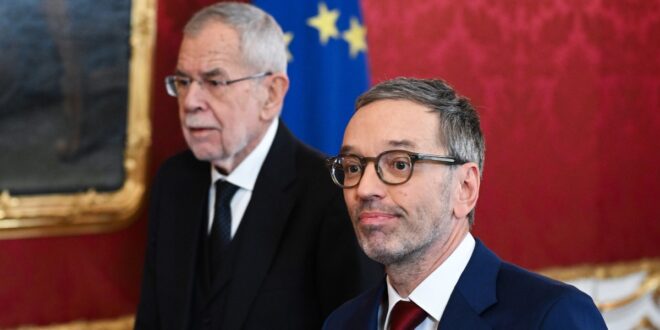Austrian President Van der Bellen invites FPÖ to form new ruling coalition
Austrian President Alexander Van der Bellen has asked the leader of the country’s far-right Freedom Party (FPÖ) to form a new ruling coalition in what could yield the first far-right-led government in Austria since World War Two.
FPÖ leader Kickl willing to find solutions in government negotiations
FPÖ leader Herbert Kickl “has the confidence to find viable solutions within the framework of government negotiations and he wants to fulfill this responsibility,” Van der Bellen said at a media conference after the two leaders met in Vienna on Monday.
Austrian lawmakers attempt to form a government
The announcement constitutes a major departure in the direction of Austrian lawmakers’ attempts to form a government, after the ruling conservatives held a crisis meeting Sunday following the resignation of current Chancellor Karl Nehammer on Saturday.
Centrist coalition efforts unsuccessful
The meeting, aimed at countering the FPÖ by cobbling together a centrist coalition of the Social Democrats and liberals, was ultimately unsuccessful and left Van der Bellen with few options.
Austrian president’s efforts to form a coalition
The Austrian president, whose job it is to ensure a workable government is created, had been trying to form a coalition since October. But those attempts failed after Nehammer’s conservative Austrian People’s Party, along with other parties, refused to work with the far-right FPÖ.
Nehammer’s party open to collaborating under Kickl’s leadership
Nehammer’s party indicated it was open to collaborating under Kickl’s leadership following his resignation.
Far-right FPÖ’s rise in popularity
During Austria’s parliamentary elections in September, the FPÖ won an unprecedented 28.8% of the vote and came out on top. Opinion polls suggest that if an election were held now, support for the far-right party would be even stronger.
FPÖ’s policies and background
The Russia-friendly FPÖ, which was founded by former Nazis, advocates for strict border controls and the suspension of asylum rights through emergency laws. It also wants to oversee the “remigration of uninvited foreigners” and to create a more “homogeneous” society.
 Mind Uncharted Explore. Discover. Learn.
Mind Uncharted Explore. Discover. Learn.




